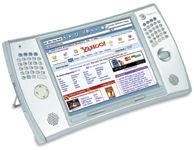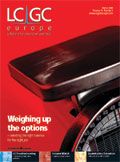New Technologies
Pepper Computer Inc. has announced a new version of software for its Pepper Pad handheld media computer that brings users major new capabilities, such as integration with Yahoo's industry-leading Flickr photo-sharing community, while giving the Pad quicker performance.
Handheld Media Computer
Pepper Computer Inc. has announced a new version of software for its Pepper Pad handheld media computer that brings users major new capabilities, such as integration with Yahoo's industry-leading Flickr photo-sharing community, while giving the Pad quicker performance. Version 2.1 will be delivered on Pads shipping later this month and will be available free of charge to existing Pad owners through Pepper's software update button. Both the Mobipocket eBook and Flickr photo-sharing applications can also be accessed using the Pepper Desktop software for PCs.

The Pepper Pad is the handheld media computer that enables consumers to hold the world of digital media and broadband services in their own two hands. At just 1 kg and less than 1 in. thick, rugged and splash resistant, the Pepper Pad is perfect for the laboratory.
For more information visit www.pepper.com
New Ultra Thin Flexible Battery
NEC Corporation has announced that it has succeeded in the development of an ultra-thin, flexible, rechargeable battery capable of super-fast (30 s) charging, which can be embedded into smartcards and intelligent paper. The new organic radical battery (ORB) uses a type of plastic called organic radical polymer as its cathode. Organic radical polymer assumes an electrolyte-permeated gel state and is the reason why the rechargeable battery is so remarkably flexible and pliant. In addition, the organic radical polymer electrode reaction is extremely fast and the supporting salts migrate through gel state polymer very smoothly. This results in little resistance to the charging reaction and an incredibly fast charging time of less than 30 s. Not only is this new battery thin, flexible and rechargeable, but it is also environmentally friendly, as unlike conventional rechargeable batteries, it does not contain any harmful heavy metals such as mercury, lead or cadmium.

Courtesy of NEC Corporation. Unauthorized use not permitted.
NEC anticipates that its new and unique battery will be used extensively in the future to power all kinds of tiny ubiquitous terminals. The interconnection of networks with battery-powered next generation devices will enable all kinds of objects to become terminals, bringing us closer to a ubiquitous networked society by allowing access to the network anytime, anywhere.
For more information visit www.nec.com
Determining Enhanced Sensitivity to Odors due to Anxiety-Associated Chemosignals with GC
May 8th 2025Based on their hypothesis that smelling anxiety chemosignals can, like visual anxiety induction, lead to an increase in odor sensitivity, a joint study between the University of Erlangen-Nuremberg (Erlangen, Germany) and the Fraunhofer Institute for Process Engineering and Packaging (Freising, Germany) combined behavioral experiments, odor profile analysis by a trained panel, and instrumental analysis of odorants (gas chromatography-olfactometry) and volatiles (gas chromatography-mass spectrometry).
Investigating 3D-Printable Stationary Phases in Liquid Chromatography
May 7th 20253D printing technology has potential in chromatography, but a major challenge is developing materials with both high porosity and robust mechanical properties. Recently, scientists compared the separation performances of eight different 3D printable stationary phases.
Detecting Hyper-Fast Chromatographic Peaks Using Ion Mobility Spectrometry
May 6th 2025Ion mobility spectrometers can detect trace compounds quickly, though they can face various issues with detecting certain peaks. University of Hannover scientists created a new system for resolving hyper-fast gas chromatography (GC) peaks.

.png&w=3840&q=75)

.png&w=3840&q=75)



.png&w=3840&q=75)



.png&w=3840&q=75)










